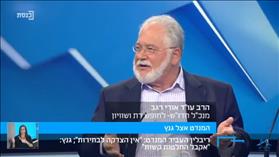A panel of two discusses the political events of the day
Hiddush on the Knesset TV channel
I'd like to share my insights from a panel I participated in today, broadcast on the Knesset TV channel. In the program, a panel of two reacts to the political events of the day. My co-panelist was an Orthodox economist who plays a leadership role in the Jewish Home party.
Uri Regev 24/10/2019 18:27
Tags: Uri Regev · Jewish Home · Jewish Home party · Zionist Orthodox · Zionist Orthodoxy · Knesset · Knesset TV channel · 2019 elections

Uri Regev on the Knesset Channel, October 24, 2019
In today's program on the Knesset TV channel, a panel of two reacted to the political events of the day. My co-panelist was an Orthodox economist who plays a leadership role in the Jewish Home party. The debate between us during the 30 minute program and the subsequent conversation I had with him sharpened an insight that I’d associated in the past with ultra-Orthodox fundamentalist politicians. Now I realized that it is an integral element in the mindset of those who present a modern, professional, and critically thinking perspective.
To put it in clearer terms, what became apparent was that he is a prime sample of the often quoted maxim, “Don’t confuse me with the facts, my mind is made up.” Two key examples, one of which was aired during the program and the second that became clear during the conversation afterwards:
- He flatly denied my reference to the fact that the overwhelming majority of Israeli Jews favor religious freedom and equality in shouldering the civic burden. I emphasized that this has come to a head in the challenging Coalition negotiations. He claimed that the majority of Israeli Jews are traditional, oppose the demands for change in the religious ‘status quo’ and want to maintain Israel’s Jewish character. While I agreed with him that most Israeli Jews, including me, want to maintain the state’s Jewish character, this should not be understood to mean that we support religious coercion, nor surrender to ultra-Orthodox dictates. I challenged him to come up with one survey in which the public has been shown to support any one of the major disputes over religion and state. Not only was he unable to cite such a study, but he dismissed all such surveys and claimed that they couldn’t be relied upon because they were commissioned by interested parties. He didn’t budge even when I pointed out to him that the same results could be found in surveys conducted by the Central Bureau of Statistics, commissioned by the Israel Democracy Institute and Tel Aviv University’s Conflict Resolution Institute. It was clear that he couldn’t care less about the facts, and he didn’t feel a need to go beyond his preconceived claim that the majority of Israeli Jews favor the perpetuation of religious coercion and inequality. As our readers know, we have been careful to analyze and point out that support for religious freedom and equality is not just the position of secular Israelis, but also – of traditional ones.
It was clear that he couldn’t care less about the facts, and he didn’t feel a need to go beyond his preconceived claim that the majority of Israeli Jews favor the perpetuation of religious coercion and inequality.
- I thought he would at least be supportive of position of all leading economists who see the role played by the ultra-Orthodox parties in government policymaking as threatening Israel’s economic well-being, and thus its future. As it turned out, this was not the case. He had no specific response to any of the economic analysis I mentioned, such as: Professor Dan Ben David, Prof. Stanley Fischer and his successor Dr. Karnit Flug, Prof. Eugene Kandel, and others. Rather, he maintained that Israel’s economic thriving since its founding and during the many years that the ultra-Orthodox parties served in the coalition is proof of the fallacy of these economic analyses. Moreover, he claimed, Israel’s economic success is predicated on God’s providence. I’ve heard this argument before from MK Rabbi Moshe Gafni, the powerful chair of the Knesset Finance Committee, but I never thought I would hear it from an academic, Modern Orthodox activist. Clearly, both post a serious threat to Israel as a Jewish and democratic state and society. Today’s panel provided me with further proof and reminder that Israel’s well-being would be better served if it was not dependent upon them as a swing vote in the Knesset.
* * *
It’s now “acharei ha-chagim” as they say in Israel, meaning that the holidays are over and it’s back to business. The business of the day in Israel is figuring out if and how a government coalition could be formed without having a third round of elections. The likelihood of squaring the political circle is slim. The question is: what price would Benny Gantz and his Blue & White party (who now hold the mandate to assemble the government) be willing to pay? To me, one thing is clear – maintaining the ‘status quo’ is unacceptable. Blue & White’s own voters oppose this vehemently, and the overwhelming majority of Israelis want to finally end the religious parties’ stranglehold.
(If you’re interested in viewing the recording of the panel in Hebrew, click here: https://youtu.be/Ac7P_YkpPNo)